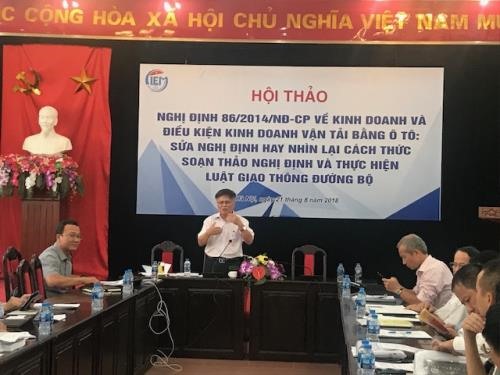State management bodies need to consider the market in terms of the development of new technologies and business methods, rather than using administrative procedures to intervene in the operation of auto transport businesses, said Director of the Central Institute for Economic Management (CIEM) Nguyen Dinh Cung.

State management bodies need to consider the market in terms of the development of new technologies and business methods, rather than using administrative procedures to intervene in the operation of auto transport businesses, said Director of the Central Institute for Economic Management (CIEM) Nguyen Dinh Cung.
Speaking at a seminar on draft revisions to Decree 86/2014/ND-CP on conditions for auto transportation business held in Ha Noi on Tuesday, Cung said State management must also follow the trend of protection and good service to customers.
The seminar acted as a forum for relevant sectors to share their views, identify issues and propose recommendations for the revision of documents or their implementation, thereby helping the Government make appropriate decisions on the issuance of the revised decree.
In terms of business conditions, the CIEM leader said that the scope of the revisions to the decree covered regulations on conditions of auto transportation businesses, granting and revoking business licences, badges and signboards, and regulations on announcing car terminals.
The draft Decree 86 is being circulated for the contribution of opinions from ministries, sectors and people. There are many new features such as the removal of some regulations and conditions on the colour of logos, operating centres, communication equipment and uniforms.
However, the CIEM leader said this was not still enough to apply old management for the new business methods to address existing shortcomings.
Cung said that with the fourth industrial revolution, there would also be a conflict between traditional models and new business trends.
Uber and Grab are just part of new business trends, sharing the digital economy, said Cung.
“Whether or not traditional activities will remain, the potential of the digital economy is huge,” said Cung.
"Do not look at a phenomenon and prevent new business trends. We should not use the traditional model to compete with businesses that apply new technology. Therefore, Vietnamese businessmen and enterprises need to bring into full play their creativity to generate artificial intelligence (AI) technology and Internet of Things (IoT) in order to develop quickly and on a large scale, so that Viet Nam does not lag behind in terms of development," he added.
Cung also said that new technology-based business methods may not be strongly encouraged and may be subject to some technical barriers, but this does not mean the abolition of this business method is necessary.
The draft decree cuts 12 business conditions, however there are 85 additional conditions.
According to Nguyen Thanh Hung, President of the Vietnam E-commerce Association (VECOM), the current Decree 86 needs significant amendments. But the new draft Decree offering more business conditions than the current decree is not appropriate. As such, the addition of business conditions should be reconsidered.
To assure the rationality and feasibility of Decree 86, economist Ngo Tri Long, who was former director of the Market Price Research Institute under the Ministry of Finance, said that the business model needs renovation.
“It is necessary to make use of the achievements of the sharing economy to save resources for society. In addition, it is essential to remove unnecessary conditions and procedures that create burdens and unnecessary costs for businesses,” said Long.
Cung proposed that State management should be shifted from pre-inspection to post-inspection and the principle of risk management should be applied.
"Before the fourth industrial revolution and new forms of business, State management must create an equally competitive environment, and create conditions for new business models and technology enterprises to develop their operations and promote the transformation of traditional business," Cung said. — VNS





